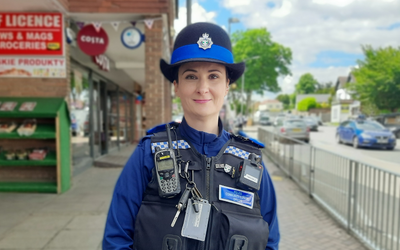PCSO Sarah Churchward proves it’s never too late to change careers
 Role: Police Community Support Officer (PCSO)
Role: Police Community Support Officer (PCSO)
Age: 44
Length of service: 1 Year
After spending 24 years at British Airways, Sarah proved that it’s never too late to change careers after joining TVP as a Police Community Support Officer (PCSO) at 44 years old. We recently caught up with Sarah about her previous career, the transferable skills she brings to the role, and what advice she would give to those considering becoming a PCSO.
What was your previous career prior to joining TVP?
My previous career was with British Airways, where I started at age 18. After a few years there, I applied for their Management Scheme in Customer Service and Operations. This lasted for four years, where I achieved academic qualifications as well as work experience. After successfully completing the Management Scheme I became a member of Cabin Crew for 17 happy years!
What transferable skills do you bring from your previous career?
Being part of Cabin Crew was all about delivering a first class customer experience to all. I would treat every customer as an individual with integrity, keeping the customer at the heart of everything I did and anticipate their particular needs and requirements. Having served with Royal Family members, Prime Ministers, high profile executives etc., I was prepared to interact with a variety of people (be it be face to face, making on board customer announcements or liaising with service partners etc.) and pre-empt various potential conflicts. This would sometimes involve dealing with difficult customers and providing resolutions to potential conflicts when pre-empting delays etc., and even resulted in having to restrain individuals mid-flight. Part of this also required me to liaise with different service partners, such as ground crew, flight staff, engineers etc.
I was also advanced medical trained (ranging from CPR and using a defibrillator, to delivering a baby on board the aircraft!), fire trained (there are no firemen at 38,000ft!), bomb threat trained, handcuff and restraint trained, emergency evacuation trained, and had to undergo intensive training every year. This all definitely prepared me for TVP’s training.
What does your day-to-day as a PCSO look like?
No two days are the same as a PCSO, and that’s what I love! I can have a plan of action, but I don’t always know how my day will play out as it could all change at the last minute depending on what jobs come in. Adding to that, no two jobs are the same! For example, I could be sent to collect evidence, complete welfare checks, attend road closures, deal with anti-social behaviour etc. I look at each and every job with open eyes and do my best to solve the problem and give the people involved the support and reassurance they need.
What are the most rewarding and challenging aspects of your role?
The most rewarding aspect of being a PCSO is when a member of the public says: “Sarah, thank you so much for all your had work – you have made such a difference.” That makes me so happy. I had one job where the residents were dealing with various different issues, and I worked with partner agencies to resolve the problems, I spent hours helping, and have since received feedback from a Police Officer saying how grateful they were for my work and how happy they were. Supporting vulnerable members of the public and doing my utmost to give them my support is equally as rewarding and I consider myself very lucky to be able to help in this way as a PCSO.
My role can also be occasionally challenging when attempting to get the appropriate support for vulnerable individuals from partner agencies in a timely manner. Saying that, although my role can be emotionally challenging, my time at British Airways and life experience has equipped me to deal with the emotional aspects I face. I take every day as a new day, and know how to deal with distressing witnesses and move on. If I can make one person happy, that makes me happy. That’s why I joined policing as a PCSO – to help protect my community and make it stronger and more resilient.
What advice would you give to those considering becoming a PCSO? Particularly those who are potentially later in life?
Go for it! You’ve got endless transferable skills and life experience and it’s such a fantastic job where no two days are the same. If you’re a people person and enjoy helping others, this job is for you and you’ll be given all the tools, support and training to become a brilliant PCSO. I absolutely love it and I’m sure you will too!
–
If Sarah’s story has inspired you to consider a career as a PCSO, visit our PCSO page for further information and begin your journey.


 Facebook
Facebook
 Twitter
Twitter
 Linkedin
Linkedin
 Instagram
Instagram